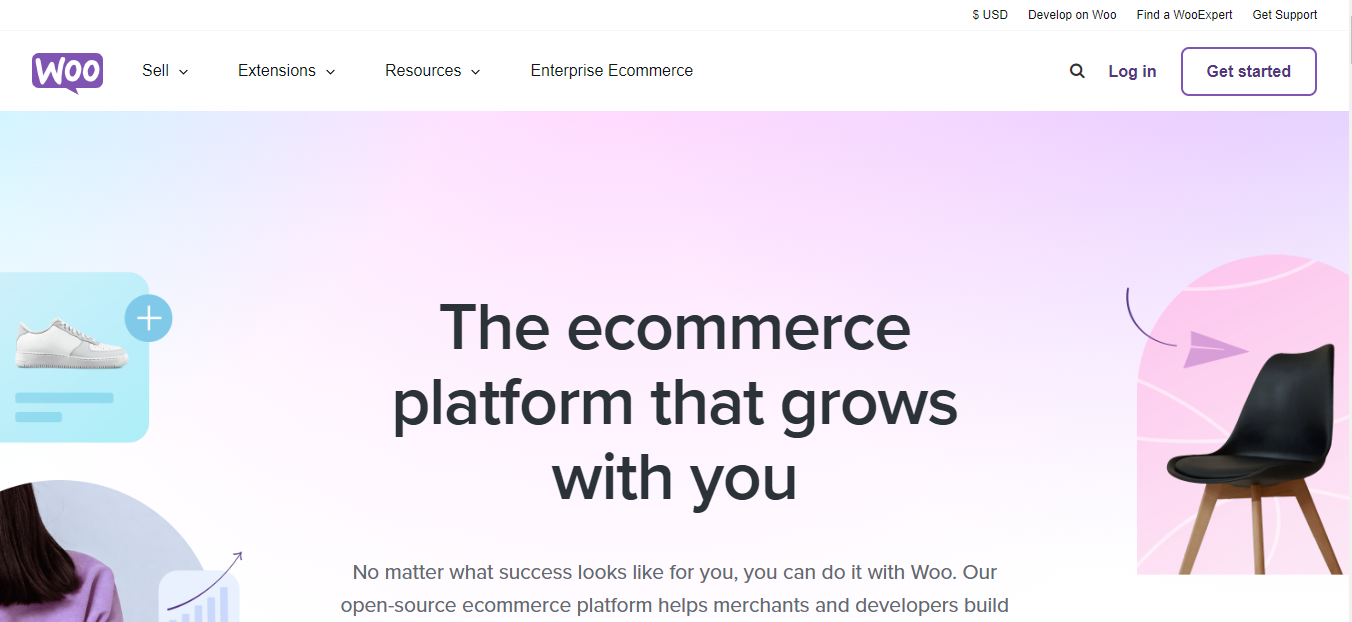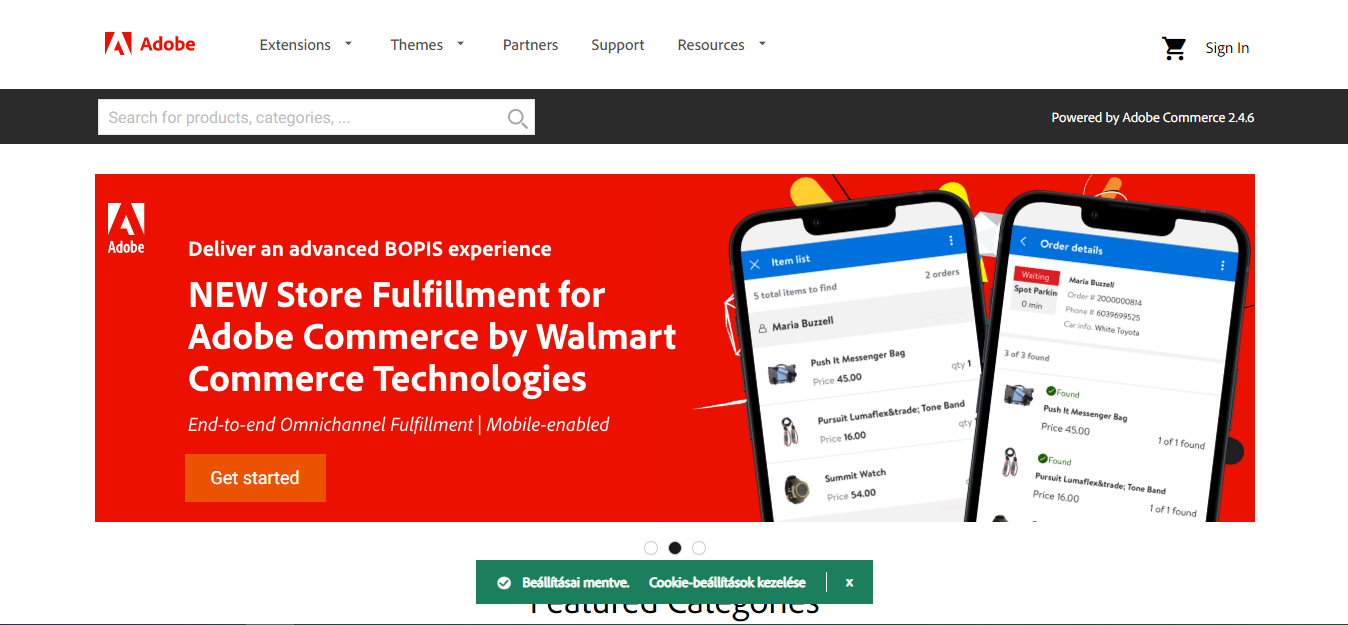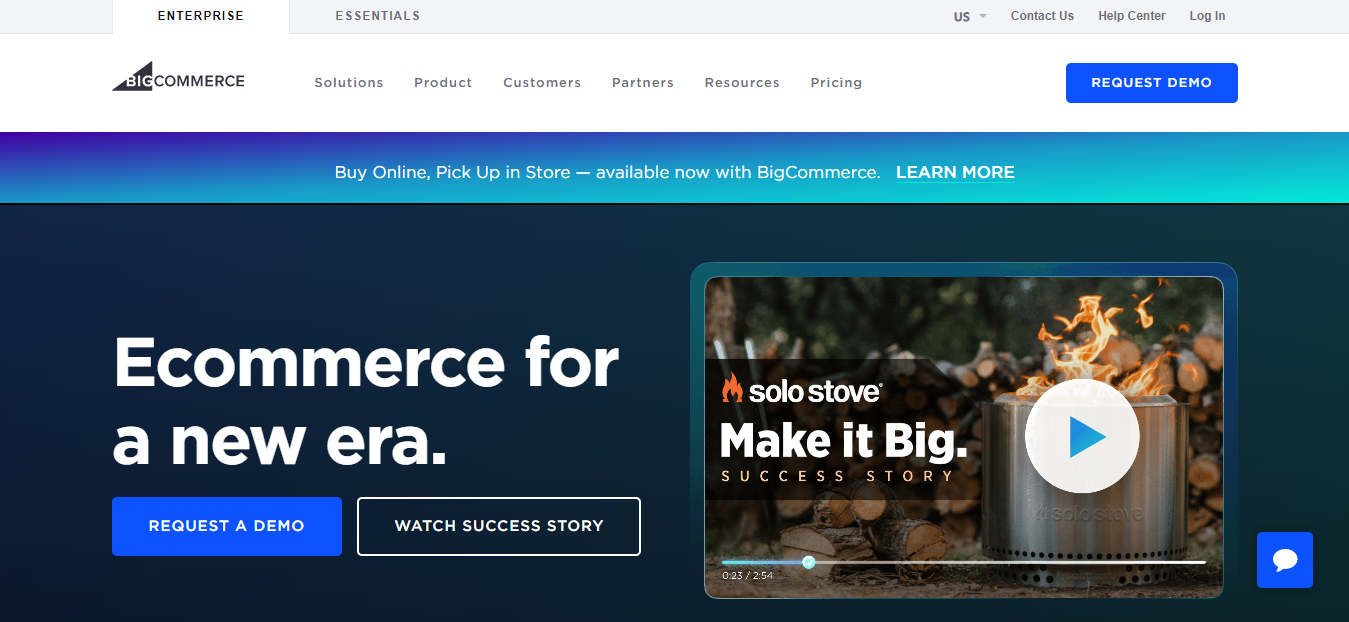Finding the best Shopify alternative is hard because it is a popular ecommerce platform that has been dominating the market for years.
However, with the increasing demand for online stores, new ecommerce platforms have emerged that offer similar functionalities as Shopify.
In this article, we will be discussing some of the best Shopify alternatives available in the market.
What is an ecommerce platform?

An ecommerce platform is a software application or platform that allows businesses to create and manage online stores.
It typically provides tools for managing products, orders, payments, and shipping, as well as marketing and analytics features to help businesses promote and grow their online stores.
An ecommerce software platform can also integrate with other software and services, such as payment gateways, shipping carriers, and marketing tools, to provide a complete solution for managing an online store.
There are various types of ecommerce platforms available, ranging from hosted solutions to self-hosted platforms.
Hosted solutions, such as Shopify and BigCommerce, are managed by the platform provider and offer a range of features and integrations out of the box.
Self-hosted platforms, such as Magento and WooCommerce, require more technical knowledge and setup but offer greater flexibility and control over the online store.
Overall, an ecommerce platform is an essential tool for businesses looking to sell their products or services online.
It provides a range of features and integrations to help businesses manage and grow their online stores, as well as a user-friendly interface for managing digital products,, orders, and payments.
6 Best Shopify Alternatives
| Best Shopify Alternatives | Price | Reviews |
|---|---|---|
| 1. WooCommerce | Free/ depends on themes | 4.9  based on 7958 reviews |
| 2. Magento | $4 to $500/month | 4.8  based on 8314 reviews |
| 3. BigCommerce | $29/month | 4.6  based on 7842 reviews |
| 4. Wix | $17/month | 4.5  based on 10093 reviews |
| 5. Squarespace | $23/month | 4.4  based on 2475 reviews |
| 6. Volusion | $35/month | 3  based on 357 reviews |
1. WooCommerce

WooCommerce is an open-source ecommerce platform that seamlessly integrates with WordPress, the most popular website content management system.
It is designed to provide a flexible and customizable solution for businesses looking to set up an online store.
With over 3 million active installations, WooCommerce has established itself as a leading ecommerce plugin.
Product management capabilities

One of the key features of WooCommerce is its comprehensive product management capabilities.
Businesses can easily add, edit, and organize products within the WordPress admin interface.
This includes setting product descriptions, prices, images, stock levels, and variations.
The platform also offers the ability to create product categories and tags, facilitating effective product organization and navigation for customers.
To facilitate secure and seamless transactions, WooCommerce integrates with over 140 payment gateways, including popular options like PayPal, Stripe, and Square.
This enables businesses to offer a range of payment options to their customers, accommodating different preferences and needs.
Additionally, WooCommerce supports multiple currencies and tax configurations, making it suitable for global sales.
WooCommerce provides robust shipping management features, allowing businesses to set up shipping zones, rates, and methods.
This includes options for flat-rate shipping, free shipping, or customizable shipping calculations based on weight, dimensions, or destination.
Integration with popular shipping carriers and fulfillment services is also available, streamlining the shipping process for businesses.
Customizability
Customizability is a significant advantage of WooCommerce.
It offers a wide range of themes and templates to create visually appealing online stores.
Additionally, the platform supports the use of plugins and extensions, providing businesses with the ability to enhance the functionality of their store.
There are numerous WooCommerce-specific extensions available, catering to various needs such as email marketing, social media integration, inventory management, and more.
Scalability
Scalability is another notable aspect of WooCommerce.
The platform can accommodate businesses of all sizes, from small startups to large enterprises.
As a business grows, WooCommerce can handle increased traffic, product catalog size, and transaction volumes without compromising performance.
Open source

Being an open-source solution, WooCommerce is free to use.
It allows businesses to take advantage of its core features without any licensing costs.
However, it’s worth noting that additional costs may arise from purchasing premium themes, extensions, or acquiring professional support.
Community
WooCommerce benefits from an extensive community of developers and users.
This ensures a wealth of available resources, including forums, tutorials, and documentation.
However, official dedicated support from WooCommerce is limited, and businesses may need to rely on third-party support or developers for more complex issues.
Security
In terms of security, WooCommerce follows industry best practices and undergoes regular updates to address vulnerabilities and ensure a secure shopping experience for customers.
However, as with any self-hosted platform, it’s important for businesses to prioritize proper security measures, such as SSL certificates and robust hosting.
Overall, WooCommerce is a powerful ecommerce platform that provides businesses with a customizable and scalable solution for setting up and managing their online stores.
With its integration with WordPress, extensive customization options, and support for various payment gateways, WooCommerce is a popular choice for businesses looking to establish a robust online presence.
2. Magento

Magento is a comprehensive and highly customizable ecommerce platform catering to the needs of large businesses and enterprises.
It provides an array of tools and functionalities to create and manage online stores, prioritizing scalability, performance, and flexibility.
Product management capabilities
A key highlight of Magento is its robust product management capabilities.
It empowers businesses to effortlessly handle large catalogs with thousands of products, including variations, attributes, and custom options.
The platform offers extensive control over product attributes, pricing, inventory management, and categorization, enabling businesses to establish intricate product hierarchies and deliver personalized shopping experiences.
Magento boasts an extensive range of marketing and promotional features to drive sales and engage customers.
It facilitates the creation of targeted promotions, discounts, and coupons, along with advanced segmentation capabilities for personalized content and offers.
Additionally, Magento supports search engine optimization (SEO) best practices, allowing businesses to optimize their online stores for improved search engine visibility.
Scalabilty

Scalability stands out as a major strength of Magento, making it ideal for high-volume and rapidly expanding businesses.
The platform can effortlessly handle thousands of concurrent transactions and supports multiple storefronts, languages, and currencies.
Built-in caching, indexing, and performance optimization features ensure swift page load times and a seamless user experience, even when dealing with extensive product catalogs.
Customizability
Customizability is another key advantage of Magento.
Its flexible architecture empowers businesses to tailor their online stores to their specific requirements.
The platform supports custom themes and templates, enabling the creation of unique and visually appealing storefronts.
Moreover, the extensive marketplace offers thousands of extensions and integrations, allowing businesses to enhance store functionality and integrate with third-party systems.
Magento provides robust built-in analytics and reporting tools, delivering valuable insights into sales, customer behavior, and store performance.
This data equips businesses to make informed decisions, optimize marketing strategies, and identify growth opportunities.
Open source
As an open-source platform, Magento offers a free community edition.
However, businesses seeking enterprise-level features and support services can opt for the Magento Commerce edition, which incurs a licensing fee.
Learning Curve

While Magento offers powerful features and flexibility, it does require a steeper learning curve compared to simpler ecommerce solutions.
Setting up and maintaining Magento necessitates technical expertise, and the hosting requirements can be more demanding, potentially resulting in higher costs.
Additionally, while Magento has a large community, obtaining dedicated support from the platform’s developers can be expensive for businesses requiring extensive assistance.
In summary, Magento is a comprehensive and highly customizable ecommerce platform tailored for larger businesses.
Its extensive feature set, scalability, and flexibility make it a suitable choice for enterprises seeking to build intricate and personalized online stores.
However, businesses must be prepared for the associated technical requirements and potential costs related to licensing, hosting, and development.
3. BigCommerce

BigCommerce is an ecommerce platform that simplifies the process of creating and managing online stores.
It offers a wide range of features and functionalities to help businesses effectively sell products and services on the Internet.
Friendly interface
One of BigCommerce’s notable strengths lies in its user-friendly interface and intuitive store management system.
Setting up an online store is straightforward, even for those without extensive technical expertise.
The platform’s user interface is designed to be intuitive, enabling businesses to efficiently manage products, inventory, orders, and customer data.
Product management capabilities
BigCommerce comes equipped with a comprehensive set of built-in features that cater to various aspects of ecommerce.
Businesses can easily create and organize product listings using its flexible product management tools.
The platform also offers robust inventory management capabilities, including inventory tracking and alerts for low stock levels.
Additionally, its order management features streamline the process of processing orders, managing shipping, and handling returns.
Multiple payment gateways

Integration with multiple payment gateways is a key advantage of BigCommerce.
Businesses have the freedom to choose from a variety of payment options, including popular gateways like PayPal, Stripe, and Square.
BigCommerce Payments, the platform’s built-in payment solution, simplifies the payment setup process for businesses.
Mobile optimization
With the increasing popularity of mobile commerce, BigCommerce ensures that online stores are mobile-responsive, providing a seamless shopping experience across different devices.
This mobile optimization is essential as more customers use smartphones and tablets for online shopping.
BigCommerce allows businesses to effectively engage their mobile audience.
Search engine optimization

In terms of marketing and search engine optimization (SEO), BigCommerce offers a range of tools to promote online stores and improve their visibility.
Businesses can leverage built-in SEO features like customizable URLs and meta tags to enhance their organic search rankings.
The platform also integrates with popular marketing tools, enabling businesses to run email marketing campaigns, create promotions, and analyze customer behavior.
BigCommerce’s app marketplace allows seamless integration with third-party applications and services, offering businesses additional functionalities and integrations to enhance their online stores.
This includes integrations with accounting software, email marketing platforms, and customer support tools, among others.
Analytics
The platform provides robust analytics and reporting capabilities, allowing businesses to gain valuable insights into store performance, sales trends, customer behavior, and marketing campaigns.
This data-driven approach enables businesses to make informed decisions and optimize their ecommerce strategies.
Customer support
BigCommerce offers comprehensive customer support through multiple channels, including email, live chat, and phone support.
Extensive documentation, tutorials, and community forums are also available to assist businesses in resolving issues and finding answers to their questions.
While BigCommerce provides pricing plans suitable for businesses of different sizes, it may not be as cost-effective for small businesses or startups compared to other ecommerce platforms.
In summary, BigCommerce simplifies the process of creating and managing online stores with its user-friendly interface and robust features.
With its comprehensive set of tools, mobile-commerce capabilities, marketing features, integration options, and strong customer support, BigCommerce offers businesses a powerful solution to establish and run successful online stores.
4. Wix

Wix is a popular website builder that offers a comprehensive solution for creating and managing websites, including ecommerce sites.
It stands out for its user-friendly approach, allowing individuals and businesses of all technical levels to easily create professional-looking websites.
Ease of use
One of Wix’s notable strengths is its simplicity and ease of use.
With its intuitive drag-and-drop editor, users can effortlessly customize their websites by selecting elements, modifying their appearance, and positioning them as desired.
This eliminates the need for coding knowledge and makes website creation accessible to a wide range of users.
Personalization
Wix provides a wide selection of templates specifically designed for ecommerce websites.
These templates are fully customizable, enabling businesses to create a unique online store that aligns with their branding.
Users can personalize layouts, colors, fonts, and images to achieve a visually appealing and professional storefront.
Ecommerce functionality

In terms of ecommerce functionality, Wix offers essential features for online selling.
Users can easily add product listings, set prices, and manage inventory.
The platform integrates seamlessly with popular payment gateways, ensuring secure online transactions.
Wix’s built-in shopping cart enables customers to add products to their cart and complete the checkout process smoothly.
To support marketing efforts, Wix offers a range of promotional tools.
Users can create and run effective marketing campaigns, implement discounts and coupons, and employ strategies for recovering abandoned carts.
The platform also includes search engine optimization (SEO) features, allowing users to optimize their websites for better visibility in search engine results.
Mobile optimization
Wix places a strong emphasis on mobile responsiveness.
Websites created on the platform are automatically optimized for mobile devices, ensuring a seamless browsing experience across different screen sizes.
With the increasing mobile usage for online activities, this feature is crucial for businesses to engage and convert mobile visitors.
Hosting services.
Wix takes care of website hosting, providing users with reliable and secure hosting services.
Websites hosted on Wix benefit from high uptime and fast loading speeds, contributing to a positive user experience.
The platform also includes SSL certification for secure data transmission, giving customers peace of mind when making online transactions.
While Wix offers a range of features and templates, it may have some limitations in terms of customization options compared to more advanced ecommerce platforms.
Users might encounter design constraints or find certain advanced functionalities unavailable.
However, for small to medium-sized businesses or individuals seeking an easy-to-use and cost-effective solution, Wix remains a viable choice.
Support system

Wix provides a support system for users to access assistance and resources.
Users can explore the knowledge base, tutorials, and community forums to find answers to their questions.
Additionally, Wix offers customer support channels to address technical issues or inquiries.
In summary, Wix is a user-friendly website builder that offers a comprehensive solution for creating and managing ecommerce websites.
With its intuitive interface, customizable templates, essential ecommerce features, marketing tools, mobile responsiveness, and reliable hosting, Wix serves as a suitable option for businesses looking to establish a professional online presence and start selling products or services.
5. Squarespace

Squarespace is a popular website-building platform that enables users to create and manage professional websites, including ecommerce sites, without the need for coding knowledge.
It offers a range of features and templates designed to provide visually stunning and functional websites.
Modern design
One of the standout features of Squarespace is its emphasis on beautiful and modern designs.
The platform provides a wide selection of visually appealing templates that are crafted by professional designers.
These templates cover various industries and can be easily customized to match the unique branding and style of a business.
User friendly

Squarespace offers an intuitive and user-friendly interface, making it accessible to individuals with limited technical expertise.
Its drag-and-drop editor allows users to easily add, arrange, and customize content elements on their web pages.
The platform also provides a grid system that assists with precise positioning and alignment of elements.
Ecommerce functionality
Ecommerce functionality is a key aspect of Squarespace.
Users can set up online stores and sell physical or digital products, subscriptions, and services.
The platform includes features such as inventory management, order processing, and secure payment integration.
It also offers options for flexible shipping and tax calculations to accommodate different business needs.
The platform provides tools for displaying high-quality images and videos, making it ideal for businesses that rely on visual content to showcase their products or services.
It also offers blogging capabilities, allowing users to create engaging blog posts and share valuable content with their audience.
Mobile responsiveness
Mobile responsiveness is a crucial aspect of Squarespace.
All templates offered by the platform are optimized for mobile devices, ensuring a seamless browsing experience for visitors accessing websites on smartphones and tablets.
This is essential as mobile usage continues to grow, and businesses need to cater to users on various devices.
Search engine optimization
Squarespace includes built-in search engine optimization (SEO) features to help websites rank higher in search engine results.
Users can optimize their site titles, meta descriptions, and URLs to improve visibility and attract organic traffic.
The platform also integrates with popular marketing tools, enabling users to implement email marketing campaigns, track visitor behavior, and analyze website performance.
Hosting services

Squarespace provides reliable hosting services, ensuring that websites are fast and accessible to visitors.
The platform handles security measures, including SSL certificates for secure data transmission, to protect sensitive information shared during transactions.
It also offers 24/7 customer support via email and live chat to assist users with any technical issues or inquiries.
Customizable
While Squarespace offers a range of features and templates, it may have limitations in terms of advanced customization options compared to more flexible platforms.
Users might encounter certain design constraints or find it challenging to implement complex functionalities.
However, Squarespace remains a popular choice for individuals and small businesses looking for a visually stunning and user-friendly website building solution.
In summary, Squarespace is a website building platform that combines beautiful designs, user-friendly interfaces, and robust ecommerce functionality.
With its visually appealing templates, intuitive editing tools, ecommerce features, mobile responsiveness, SEO capabilities, and reliable hosting, Squarespace offers users an all-in-one solution to create and manage their online presence effectively.
6. Volusion

Volusion is an ecommerce platform that empowers businesses to build and operate online stores with ease.
It offers a comprehensive range of features and functionalities to simplify the entire process of creating and managing an ecommerce website.
User-friendly
A notable advantage of Volusion is its user-friendly interface, designed to streamline the management of online stores.
The platform provides an intuitive dashboard that allows users to navigate effortlessly through different sections and perform tasks efficiently.
Whether it’s adding products, processing orders, or analyzing sales data, Volusion simplifies these operations, making it accessible to users of varying technical expertise.
Product management capabilities
An impressive aspect of Volusion is its robust product management capabilities. Users can easily add, edit, and organize their products efficiently within the platform.
With the ability to create detailed product listings, including comprehensive descriptions, images, pricing information, and inventory tracking, businesses can showcase their offerings effectively.
Moreover, Volusion supports various product types, including physical goods, digital downloads, and subscription-based products, providing versatility to cater to diverse business models.
Payment gateways
Volusion seamlessly integrates with popular payment gateways, ensuring secure and reliable online transactions.
It supports a wide range of payment options, including credit cards, PayPal, Apple Pay, and more.
This comprehensive payment integration ensures that customers can complete their purchases smoothly, contributing to a seamless and convenient shopping experience.
Inventory management

Users can easily monitor inventory levels, set stock alerts, and manage product variations, such as different sizes or colors.
This functionality aids in maintaining accurate inventory records, preventing overselling, and facilitating timely restocking, all of which are critical for efficient store management.
Marketing feature-rich
Volusion includes a suite of marketing features to help businesses promote their online stores and attract customers.
The platform offers SEO-friendly tools, including customizable URLs and meta tags, enabling users to optimize their websites for improved search engine visibility.
Additionally, Volusion provides options for running promotional campaigns, creating discounts, and integrating with email marketing services, facilitating customer engagement and encouraging repeat purchases.
Analytics
The platform offers comprehensive analytics and reporting capabilities, providing users with valuable insights into the performance of their online stores.
Users can track sales, monitor visitor behavior, and analyze the effectiveness of marketing campaigns.
By leveraging this data-driven information, businesses can make informed decisions to optimize their strategies, enhance conversions, and drive revenue growth.
Customer support

Volusion offers reliable customer support through multiple channels, including phone, email, and live chat.
Their knowledgeable support team is readily available to assist users with technical issues and general inquiries.
Furthermore, Volusion provides a wealth of resources, including an extensive knowledge base and community forums, where users can access helpful information and engage with other Volusion users.
Although Volusion offers a wide array of features, it may have limitations in terms of customization options compared to more flexible ecommerce platforms.
Users might encounter constraints when customizing designs or face challenges when implementing advanced functionalities.
However, for businesses seeking a straightforward and dependable ecommerce solution, Volusion proves to be a viable choice.
In summary, Volusion is an ecommerce platform that offers a user-friendly interface, customizable templates, robust product and inventory management, seamless payment integration, marketing features, advanced analytics capabilities, and reliable customer support.
With these features, Volusion provides businesses with the necessary tools to create and manage successful online stores, making it an attractive option for those in search of a comprehensive and user-friendly ecommerce solution.
Conclusion

In conclusion, there are many Shopify alternatives available in the market that offer similar functionalities and features.
The best ecommerce platform for your business will depend on your budget, business size, and specific needs.
We hope that this article has provided you with valuable insights into some of the best Shopify alternatives available in the market.
Shopify is a popular ecommerce platform that has been dominating the market for years.
However, with the increasing demand for online stores, new ecommerce platforms have emerged that offer similar functionalities as Shopify.
In this article, we will be discussing some of the best Shopify alternatives available in the market.
If you liked this article, consider reading more about Magento vs WooCommerce here.
FAQ
An online store is a platform where businesses sell products or services online, while an ecommerce store is a specialized type of online store that is specifically designed for selling products or services online and has advanced features and functionalities to manage its ecommerce business operations.


